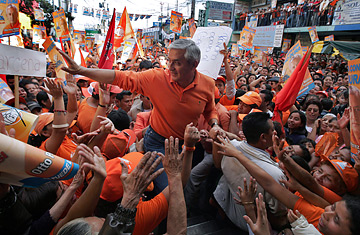
Guatemalan presidential candidate Otto Perez Molina greets supporters as he arrives to a rally.
Guatemala goes to the polls on Sunday, haunted by a violent and contested past and anxious over an increasingly violent present. The legacy of the country's 36-year-civil war is never far from contemporary politics, and the front-runner in the presidential runoff — retired General Perez Molina, whose right-wing Patriotic Party has a very slight lead over left-leaning businessman Alvaro Colom in some opinion polls — has been the subject of allegations in a new book on the 1998 assassination of Guatemalan human rights crusader Bishop Juan Gerardi. Gerardi was bludgeoned to death in the parish house of his Guatemala City church the day after he published an exhaustive report of human rights violations by the Guatemalan army during the civil war. Although three military officers were convicted of the murder and jailed in 2001, Guatemalan-American writer Francisco Goldman claims a key witness identified Molina as one of several high-ranking army men who gathered near the church on the night of the murder. But Molina dismisses the claim as "pure lies," saying he was not even in the country when Gerardi was killed.
However, Molina's slight edge in some polls — Colom actually has his own small lead in other surveys — is based on voters' concerns over present-day violence. Crime has soared in the country of 13 million since the signing of the 1996 peace agreements between leftist guerrillas and the government — close to 6,000 people were murdered last year alone. Most of the killings are blamed on violent youth gangs known as maras, or on turf battles between powerful drug cartels. And that violence has seeped into the election, with over 50 candidates and party activists killed since campaigning began last year.
An inept and often corrupt law-enforcement and justice system has left 98 percent of cases unsolved, prompting some citizens to take the law into their own hands. On Thursday, for example, an angry mob in the small town of San Juan Sacatepequez captured and burned alive three teenagers suspected of belonging to a street gang. Perez Molina has built support by promising to put more soldiers on the streets to fight crime, and to use the death penalty more frequently. He also supports temporarily suspending some constitutional rights in crime-ridden areas, a tactic used several times last year by incumbent President Oscar Berger.
Many Guatemalans, especially in the capital, where the impact of the civil war was lower than in the countryside, remember their streets being safer during the decades of authoritarian rule by military strongmen such as Gen. Efrain Rios Montt. Montt was recently elected to Congress despite facing an international arrest warrant issued by a Spanish court investigating allegations of crimes against humanity in Guatemala during his 1982-3 rule.
Newspaper columnist Dina Fernandez sees a trend at work, noting that "the fact that a military man is gaining ground in the presidential election sends the message that the civilian governments have failed."
The winner of Sunday's run-off will inherit a strong economy, which grew by 5.6 percent in 2007, the fastest annual growth in two decades, primarily driven by sugar and fruit exports. The Central American Free Trade Agreement with the United States implemented last year should lead to a more than 50 percent rise in foreign direct investment in 2007. And both parties plan to boost competitiveness by promoting foreign investment and trade. But in a country that has the highest chronic child malnutrition rate in the Western Hemisphere and the region's lowest tax rate, the economic windfall is not being equitably distributed. That's the issue being pressed by Colom's social democratic National Unity for Hope party, which has unveiled plans calling increased spending on health and education.
But security may trump the economy in the minds of voters, which will help Molina. The bulk of Colombian cocaine en route to the United States passes through Guatemala and the narco industry has had an impact even on the country's politics. Several alleged drug kingpins ran for local office in areas along key trafficking routes during the first round of voting in September.
"Organized crime is increasingly penetrating state institutions," incumbent vice president Eduardo Stein, of the ruling conservative GANA coalition told the daily Prensa Libre.
"If Guatemala doesn't make some dramatic changes we are likely to become a narco-republic."
